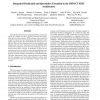Free Online Productivity Tools
i2Speak
i2Symbol
i2OCR
iTex2Img
iWeb2Print
iWeb2Shot
i2Type
iPdf2Split
iPdf2Merge
i2Bopomofo
i2Arabic
i2Style
i2Image
i2PDF
iLatex2Rtf
Sci2ools
ISCA
1998
IEEE
1998
IEEE
Integrated Predicated and Speculative Execution in the IMPACT EPIC Architecture
Explicitly Parallel Instruction Computing (EPIC) architectures require the compiler to express program instruction level parallelism directly to the hardware. EPIC techniques which enable the compiler to represent control speculation, data dependence speculation, and predication have individually been shown to be very effective. However, these techniques have not been studied in combination with each other. This paper presents the IMPACT EPIC Architecture to address the issues involved in designing processors based on these EPIC concepts. In particular, we focus on new execution and recovery models in which microarchitectural support for predicated execution is also used to enable efficient recovery from exceptions caused by speculatively executed instructions. This paper demonstrates that a coherent framework to integrate the three techniques can be elegantly designed to achieve much better performance than each individual technique could alone provide.
EPIC Techniques | Explicitly Parallel Instruction Computing | Hardware | IMPACT EPIC Architecture | ISCA 1998 |
| Added | 05 Aug 2010 |
| Updated | 05 Aug 2010 |
| Type | Conference |
| Year | 1998 |
| Where | ISCA |
| Authors | David I. August, Daniel A. Connors, Scott A. Mahlke, John W. Sias, Kevin M. Crozier, Ben-Chung Cheng, Patrick R. Eaton, Qudus B. Olaniran, Wen-mei W. Hwu |
Comments (0)

